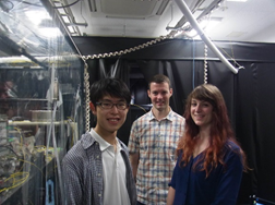Sep 3 2015
This summer we have been strengthening the link between Centre for Quantum Photonics (CQP) and the Quantum Optoelectronics Laboratory (QOL) at Kyoto University.
 From left to right: Ryotaro, Daryl and Lizzy
From left to right: Ryotaro, Daryl and Lizzy
Led by Professor Noda, QOL has world leading fabrication facilities for photonic crystal devices, allowing light to be confined in much smaller areas than the chips currently used at CQP. By developing these extraordinary devices for quantum computing applications, it could be possible to further miniaturize quantum circuits, and allow more complex operations with photons on chip.
In July, CQP postdoc Daryl Beggs and PhD student Lizzy Hemsley visited Ryotaro Konoike at Kyoto University, funded by the International Strategic Fund. Ryotaro is a PhD student specializing in the design of photonic crystal structures used to manipulate light. During the one week visit Lizzy and Daryl spent time working with Ryotaro in the lab and also gave talks on their work at CQP. It was also a great opportunity to have face-to-face discussion about chip design and how to use photonic crystal devices with single photons.
In August, Ryotaro paid a return visit to CQP for one week, bringing several chip samples with him. Lizzy and Ryotaro had an exciting week testing these new chips, and we were also treated to a fascinating talk on Ryotaro’s work on efficient light transfer between distant photonic crystal cavities.
These visits were a huge success in allowing the sharing of ideas and knowledge between the two groups, and we are looking forward to Ryotaro visiting us again in a few months, to lend us his expertise on the next stage of the project.